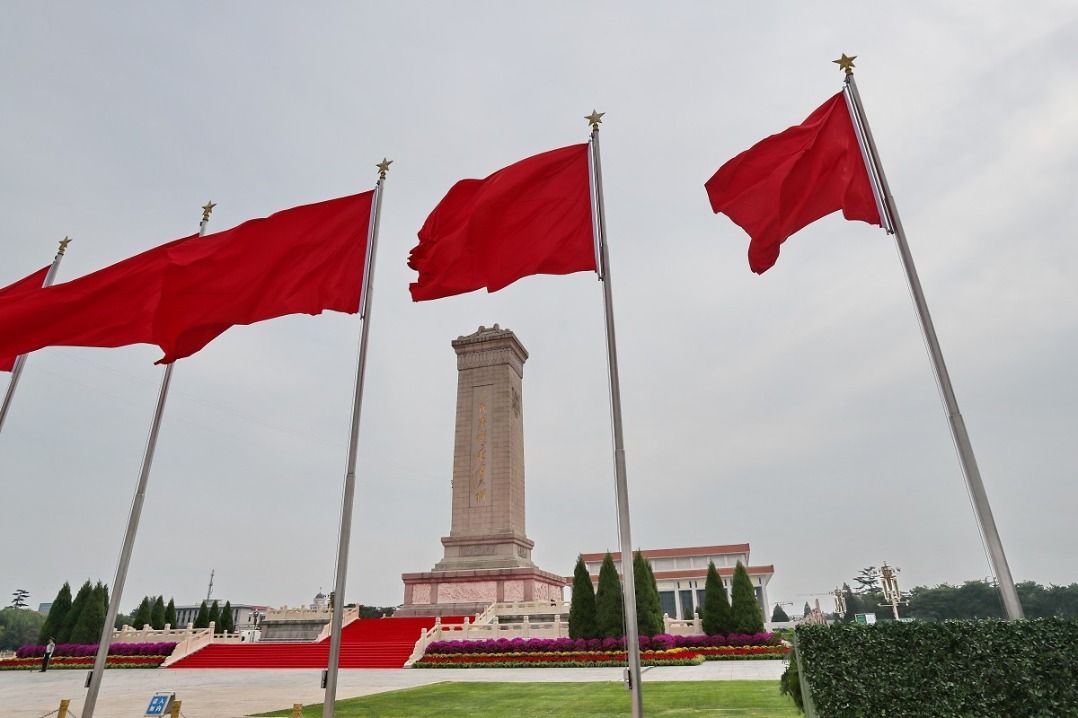US arms sales pushing Taiwan toward abyss


The White House recently announced that it has decided to provide about $345 million worth of military "assistance" to the Taiwan island under the "Presidential Drawdown Authority" framework. This marks the first use of the PDA by the Joe Biden administration to sell arms, including offensive weaponry, to Taiwan. This shift underscores a new aspect of US arms sales to Taiwan, intensifying tensions across the Taiwan Strait and straining the foundation of Sino-US relations.
First, it marks a shift in US policy, from supplying defensive arms to providing offensive weaponry to the island. According to the "Taiwan Relations Act" that the United States passed in 1979, Washington can provide Taiwan with only arms of a defensive nature.
In the Sino-US Joint Communique of Aug 17, 1982, the US said that it does not seek to carry out a long-term policy of arms sales to Taiwan, that its arms sales to Taiwan will not exceed, either in qualitative or in quantitative terms, the level of those supplied in recent years since the establishment of diplomatic relations between Washington and Beijing, and that it intends to gradually reduce its sale of arms to Taiwan, leading, over a period of time, to a final resolution.
However, in recent years, the US has openly violated its own legal provisions and political commitments by selling sophisticated, offensive weaponry to Taiwan. Examples include the $8 billion deal for 66 F-16V fighter jets, $1 billion worth of 135 AGM-84H SLAM-ER air-to-ground missiles, high mobility artillery rocket systems (HIMARS) and more.
This departure from the commitment to supply only defensive arms not only casts a shadow over cross-Strait peace but also risks undermining the strategic credibility of the US.
Second, it marks the normalization of regular arms sales to the island. In the past, the US often bundled arms sales in comprehensive packages to Taiwan. For example, during the Barack Obama administration, Taiwan received $14.07 billion worth of military equipment in three batches, including Patriot Advanced Capability-3(PAC-3) missiles, Black Hawk helicopters, and upgrades to F-16A/B fighter jets.
However, in recent years, a new "conventional arms transfer" policy has emerged, streamlining arms exports and facilitating the normalization of arms transfers. Since US President Joe Biden assumed office in 2021, the frequency of US arms sales to Taiwan has notably increased, with more than 10 arms sales in just about two and a half years. This trend is likely to continue, further deteriorating Sino-US relations.
And third, it marks a shift from conventional arms sales to the sale of weapons of an offensive nature under the US "Presidential Drawdown Authority "framework. Previously, US arms sales to Taiwan used to undergo a series of procedural reviews, including administrative approval and even congressional scrutiny for larger-scale transactions. But now the US is using new tactics to "fast track "arms sales to Taiwan, bypassing the complex and lengthy review processes.
Since the US draws parallels between the Taiwan question and the Ukraine crisis, which Washington has been prolonging by providing military aid for Kyiv, this shift in strategy raises concerns that the US might be using the "Ukraine model" of military assistance in the case of Taiwan, potentially paving the way for a "today Ukraine, tomorrow Taiwan" scenario.
There are multifaceted objectives behind the US' latest move. The US has identified China as a "strategic competitor" in its National Security Strategy. By playing the "Taiwan card", the US aims to weaken the Chinese mainland's political, economic and military capabilities, thereby slowing its modernization efforts.
Militarily, the US seeks to maintain its dominance in the Asia-Pacific region, and increase its interactions with Taiwan under the pretext of the so-called Taiwan Relations Act, turning Taiwan into a "hedgehog" or a "porcupine" against the mainland, and integrating it into its "Indo-Pacific strategy". And economically, this approach serves the interests of the US military-industrial complex, using Taiwan as a source of considerable profit.
The continuous drain on Taiwan's resources due to arms purchases from the US will have dire consequences. The Taiwan authorities have limited bargaining power against the US, which means they have to pay much higher prices than other buyers for the same weapons. The huge amounts of money Taiwan pays to the US to buy arms could have been used to improve the island's economy and Taiwan residents' livelihoods, especially at a time when the island has been grappling with economic challenges, including months of declining exports and negative economic growth in the first half of 2023.
Besides, the refusal of the Democratic Progressive Party administration to accept the 1992 Consensus that there is only one China and Taiwan is an integral part of China, and its pro-independence agenda have escalated tensions across the Strait.
Moreover, the US, through arms sales and other actions, has been provoking Beijing and encouraging the DPP to continue its pro-independence activities, which could spark conflict across the Strait. It's high time therefore that the US realized the Taiwan question lies at the core of the Chinese nation's vital interests and serves as a foundational pillar of Sino-US relations.
To facilitate a return to a healthier trajectory of Sino-US relations, the US must adhere to the one-China principle, and stop using Taiwan as a tool to contain the mainland. And the Taiwan authorities should realize the US' actions do not serve the island's best interests; instead, they have the potential to lead the island down a treacherous path. Continuing to be obstinate and ignoring the reality of the situation would only result in self-inflicted harm for Taiwan.
The author is an associate professor at the school of national security, University of International Relations. The views don't necessarily reflect those of China Daily.
If you have a specific expertise, or would like to share your thought about our stories, then send us your writings at opinion@chinadaily.com.cn, and comment@chinadaily.com.cn.
































